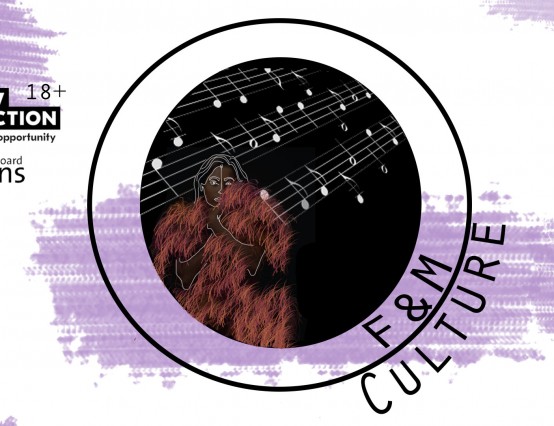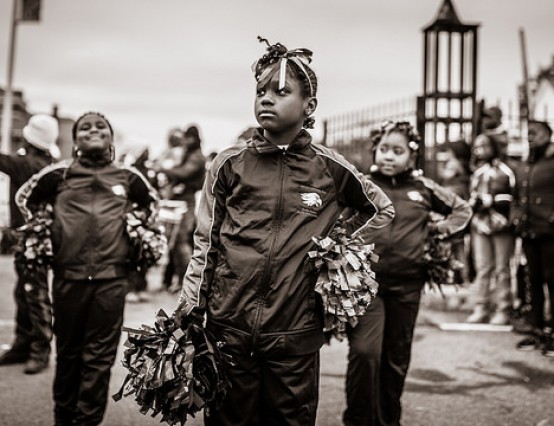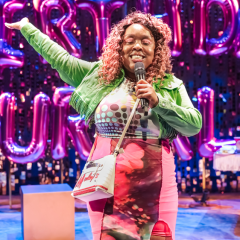In the galleries there are very few images of black people or art by black artists as a permanent display. Why is this? In music there are lots of representation may not necessarily be positive but it's there. Why is this? In theatre/films there is slow increase in the amount of lead roles given to black people. Only in February 2018 was there a predominately black cast that has been available in the mainstream. And recognition for our talents has been scarce. Oprah was the first black woman to receive a golden globe: Cecil B. DeMille Award 2018. Jordan Peele is the first African-American to win the best original screenplay Oscar. Why has it taken so long?
The arts issue I have chosen is the about representation or, lack thereof, of black people in the arts, especially in the UK. Throughout all the art forms be it in a gallery or film or theatre production, there is little to no representation in all aspects, from the production to the content. Through research I found a survey conducted in 2016. BAME people only occupy 11% of the 32, 422 people working in the UK creative sector! 11% is a shocking percentage. It was a 5.8% increase from 2015, but still that’s a small amount considering that nearly a third of the creative jobs are in London.
Looking into the film industry it seems that there is a glass ceiling that black actors/actresses face leaving them feeling that they are being “pushed out of the UK” and that they must leave the UK in order to achieve success and be validated. I have noticed that more often than not, black actors are put into stereotypical roles which are usually negative and when they are cast for ‘positive roles’ they are usually subservient placid roles whereas the role of the white co-star is the opposite. Challenges to this argument is that certain roles cannot played by certain races, for example Nelson Mandela being played by a white actor – but may I add this never stopped them white washing characters in the past for example casting white actresses to play the role of Queen Nefertiti an African Queen.
However, this is not what black actors like David Oyelowo are trying to highlight when this topic comes up, but the idea they want directors and play writes to entertain is to be willing to open up the character pool which in turn will make it more diverse. Fictional characters can be played by anyone. Why is it, the first image of a character assumed to be white? When this conversation comes up it is met with blocks and comments like, ‘do more work that merits recognition” – I do wonder how some people see the world and wish for a few hours I could live life in their shoes for a day, to experience this privilege. David asked Nash Edgerton if he ever thought of a black person for one particular role. He responded, ‘Actually, I haven’t … I’m ashamed to admit that … It’s because I’m a white guy, so I just saw him as a white guy.” This I feel is the root of the lack of diversity in the industry. The characters are imagined in the reality of the creator. The predominate and blatant display of whiteness, shows the hegemony of the creative industry is that of a white male. But in their defense, this is the way the entire world is set up.
If we take a closer look at galleries you will see that again there is little to no permanent black representation within permanent art pieces depicting black people or displays curated by black people within big institutions like the Tate and The National Portrait gallery. In my opinion, the purpose of art galleries, are supposed to capture the essence of multiple time periods and histories but yet, there is no representation unless it is a passing exhibition like Soul of a Nation. The only image that comes to mind is the image of ‘Head of a Man (?Ira Frederick Aldridge)’ and Chris Ofili’s No woman, No Cry in the Walk through British Art at the Tate Britain. How can this be in 2019? But what blame can you put where? The building that stands to this day, is a beacon dedicated to the “Great” British Empire. The statue of Britannia with a lion and a unicorn on top. The architect Sidney R.J. Smith wanted to emphasise the function as a gallery for British Art. In other words – Caucasian art. His reality.
The music industry is a slight anomaly. There is plenty black representation but similar to the film industry there is a lot of negativity and derogatory connotations. Through conversations with my peers about this topic we realised that we are the only race to celebrate our demise, to which we have concluded that this is the exact reason as to why we are ‘thriving’ in terms of representation in the music industry. I went to a talk where musician Azekel talked about ‘the black experience.’ This phrase resonated with me and got me questioning what this actually means and what it means to me. For Azekel, conversations meant he overstood the standpoint of the ‘other side’, which then meant he no longer got angry with them, instead he became less judgemental and focused on other things that he could manage and control. For instance, an incident with his daughter had her denying her blackness, which is not an isolated case. He immediately shut that down and looked for ways to empower his daughter. Through this, looking deeper, he realised that a lot, that it is associated with being black, is negative. - blackmail, blackballed, black magic, as a people we have been de-humanised. But with more conversation more people will see and associate black with positive things. When he said it and I thought about it, this is sadly accurate.
Black people have been de-humanised in order to justify the genocide and the systematic killings of black people up to this day. The process of decolonisation has begun, unravelling the toxicity that the British empire brought upon black people, but at a painfully slow pace. It is an ongoing historical process and a discourse that is invoking and questioning notions such as cultural imperialism, assumed certainties, re-imagining and re-negotiating of common futures that take society away from that of the straight upper-class white man, that have led to disproportionate prominence to the experiences and concerns. As much as we try to ignore it, Britain’s colonies were shaped by a long colonial history and built upon the backs of slaves and these notions and associations of blackness being negative live strong and are entwinned with society today. There is much to change as we can only be a product of our environment which circles back to the idea of our individual reality. So, whenever somebody asks, ‘Why is it always about race (or gender)?’…
…BECAUSE IT ALWAYS IS!
....It’s frustrating!
There are still issues that need to be sorted, conversations to be had. Until there is a change and true equality is achieved. It is imperative that we have more conversations and representations of back experiences to show that 'blackness' is not linear. There is an obvious lack of exposure which aids the negative narrative that is being lead and negative stereotypes that has infiltrated our communities and how we see ourselves and what we do and do not value for the word 'black'. There are voices setting a standard for being black which I know a little too well. Being from West London, and the way that I have been brought up, they way that I talk has always been commented on. They say I speak posh or they would say that I speak ‘white’. I just pronounce my words properly. People from both races, telling black people that they ‘act white’ or don't 'act black' because they don't behave or act a certain way.
But what is being black?
One option is to disown the label ‘black’ and open the platform to other opportunities and characteristics that have not made people 'black'. Breaking free from the negative connotations that are attached to blackness. I can see and understand this notion, but this is not our reality, or any reality. In a world where labels are prominent in our society there is no way to escape.
We are black.
That is a fact.
Even if we deny the label it doesn't necessarily mean that others will. However, conversations and exposing all possible variations of 'blackness' to show that blackness is not incidental to experience and every form of 'blackness' and 'black experiences' which should be celebrated will create more exposure and actual representations, that we can actually relate to. I love my black skin and disowning that label to me is disowning my whole identity. Azekel a black musician, is in the music industry, which, as I mentioned earlier has a lot of black representation. But to what detriment? The current music scene representation is not his reality and to this I can relate. I think the lack of representation of my reality is why I am so passionate and feel I have to prove a point with anything and everything that I do. The clothes that I make, are a statement in opening up a conversation in banishing the negative stereotypes that have been placed on black people, especially black boys. My aim is to change the narrative.
To answer the initial question, “Why is there no representation of black people in the arts?”
Author Jamaica Kincaid words it beautifully, “And might not knowing why they are the way they are, why they do the things they do, why they live the way they live, why things that happened to them happened.” But this is not an excuse and quite frankly I have had enough. Our experience is as important as theirs. And if their experience is a reflection of themselves, it just means that quite clearly, we need a larger variety of people holding the mirrors.






0 Comments